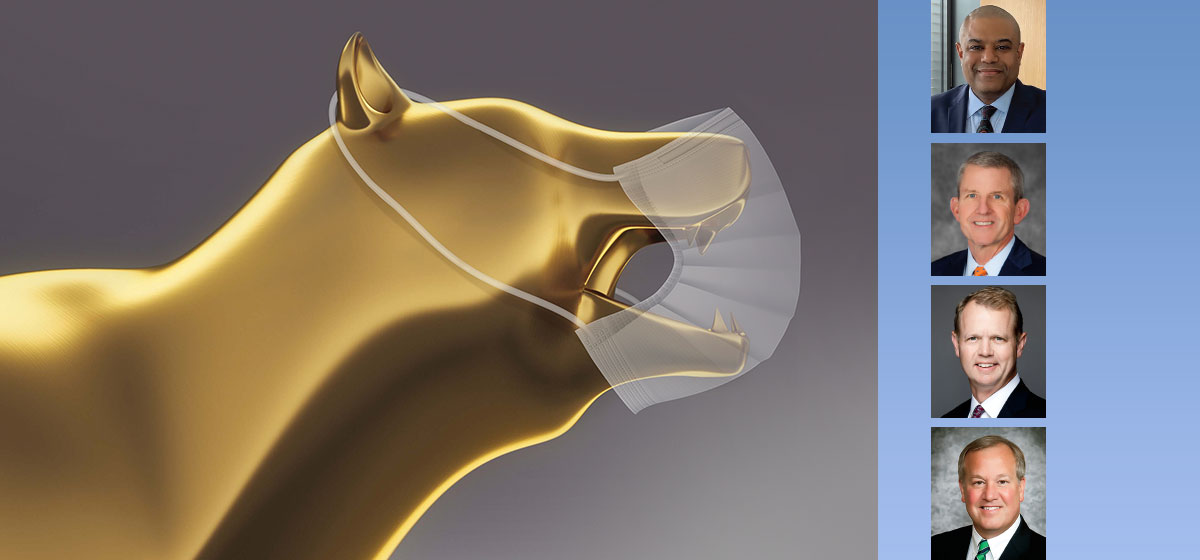Positioning Client Portfolios: PNC, Confluence Financial Partners, J.P. Morgan, Huntington

Each year in the summer issue, we ask a group of Pittsburgh’s leading investment experts to answer a question for our readers in 250 words or less. This year’s question: “The coronavirus has led to the first bear market in more than a decade with widespread uncertainty remaining. How are you positioning your client portfolios in this fraught environment?”
Erik Kimbrough, PNC Financial Services
Our PNC Wealth Management investment teams strive to build client portfolios based on clients’ financial goals and with a firm understanding of their tolerance for risk. With this in mind and knowing that timing the market is not possible, the best outcome for clients is to stay the course and not sell or deviate from their plan. Bear markets do present an opportunity to tax loss sell and to rebalance asset allocations. High quality bonds have appreciated as equities have sold off. Adding to equities during a bear market has proved to be a value-added strategy. Having a diversified portfolio with less downside risk has proved to be the best strategy over the last 20 years.
Jim Wilding, Confluence Financial Partners
While steep market declines may be unpredictable, they are not uncommon. In fact, this is the seventh time in 50 years that the S&P 500 has declined by 20 percent or more. So, the key is not to try to reposition your portfolio once the inevitable decline happens, but to start with your portfolio appropriately allocated. Then you’ll be set to weather these nasty—and temporary—declines in a manner consistent with your goals.
We always start with a plan. The most important part of our relationships with our clients is the collaborative process we use to understand their investment objectives, timeframes and risk-tolerances. We do not build a portfolio until we have created a plan—one that lays out both the short-term and longer-term goals. For example, for a recently retired couple, we need to construct a portfolio designed to earn a rate of return over the long run that allows them to maintain their lifestyle. At the same time, their portfolio must be stable enough that their spending does not need to be reduced during market declines.
Another client with different objectives may have a much different portfolio and still handle this decline. This client is investing money on a systematic basis to fund her eventual retirement in 20 years. In this case, we think equities are the best vehicle for that goal. Indeed, a market setback may work to her benefit, as periodic price declines could allow her ongoing investments to accumulate more shares of these individual securities.
Michael R. Foster, J.P. Morgan Private Bank
Clearly, this crisis and its effect on the economy and markets is extraordinary in its speed and depth. From an investment perspective, the Private Bank quickly began to evaluate the potential impact of COVID-19 on the global economy, trade and earnings for companies around the world. As it became clear that the impact would be massive, we updated our assumptions across all asset classes and looked to identify areas of risk and opportunity, understanding that the impact would be very different over the longer term depending on the specific business model, the strength of balance sheet and a different world going forward. The result was a confirmation of several investment themes which we believe will be even stronger going forward. These are the mega-trends of digital evolution, healthcare innovation and sustainability. We also recommended taking advantage of several dislocations in asset classes that sold off beyond fair value in the second half of March, such as municipal bonds and many high quality growth stocks whose long term prognosis is unchanged by COVID-19. In broader terms, the Private Bank has a healthy skepticism around stocks and current valuations in this environment, underweighting areas where the outlook is less clear while overweighting the mega-trends. Across the board in all asset classes, our recommendation is to be higher quality in most areas, while also taking opportunistic but measured risk in growth names trading at compelling valuations.
John Augustine, Huntington Bank
In times of volatility, with high risk to the economic forecast, our investment teams follow a five-point process:
- Stay balanced and diversified.
- Use a deliberate and incremental approach.
- Be in active funds versus passive funds.
- Bias toward U.S. versus ex-U.S. and large cap over small cap.
- Invest in the strongest balance sheets.
We rely on our core tenants as a fiduciary manager to ensure we proceed with prudence and care. With that in mind, here is some of our current advice that we call the “4-Rs”:
- Raise six to 12 months of your cash needs and have them separated from your investment portfolio(s).
- Reaffirm your time horizons for the stock market volatility and/or reaffirm income needs from the much lower bond yields.
- Review all holdings for suitability to your investment objectives—growth, income or principal preservation—in a total portfolio context.
- Rebalance back to your stock/bond allocation targets if your portfolio drifts too far one way or the other. Do this in a very deliberate manner with set targets to do so.
Our inclination at this time is that global health crises historically tend to last months, not years, with stock markets recovering their value quickly. We do not recommend trying to time or trade these markets as upward moves are just as rapid as downward ones.






